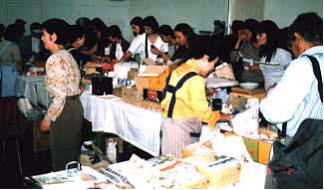No.171-2
〜Visit to Bangladesh〜
■Thank you for the donation of the T-shirts and money for Bangladesh

We visited the school that had been founded by Akkram Muhammed, his father
and his brother five years ago. Akkram now lives in Tokyo and is a Friendship
Member of Bangladesh. He was a student of the Japanese language course
at the Meguro UNESCO Association. Although the trip was a private one,
we delivered the T-shirts and notebooks contributed by Members, and brought
back the pictures we had asked them to paint for the UNESCO Art Exhibition
held in November. The donated T-shirts, which numbered about 60, were not
enough for 300 children, so we got additional T-shirts there using the
money donated for Bangladesh and the budget for activities.
The village is located in the countryside, three hours by car from the
capital, Dacca. It takes just 5 to 6 minutes to walk to the school from
Akkram's house where we stayed. We were the first Japanese to have ever
visited the village, so whenever we walked outside, we were followed by
children and surrounded at a distance by adults who stared at us with curiosity.
At the school, we saw a beautiful arch painted with the words "Meguro
UNESCO" and children lined up on both sides of the street 4 or 5 metres
in front of the arch. Many parents gathered at the yard where a reception
was held. We had mixed feelings of surprise and bewilderment when we saw
the children singing the Koran in unison and dancing.
■School facilities
The single-storey school building with a tin roof and small windows was
divided by walls into several classrooms. It was as hot as a sauna bath.
Most children aged 6 to 10 walk one to three kilometres to school, where
there are sessions in the morning and the afternoon. Although 300 students
attend school, there are neither wells nor toilets. I wonder if they are
concerned about the hygiene issues in such a high temperature. I thought
how helpful it would be if we could help in supplying them with tap water
and toilets.
■Impressions of Bangladesh-1
The Koran reaching my ears at 5 a.m. made us feel pious even though we
are not Muslims. In a country twice as large as Hokkaido live more than
120 million people. The chief industries are rice and jute. People use
trucks and buses rather than rail for transportation and I was grateful
that the national roads I drove along for three hours, were paved all the
way from Dacca. The further into the countryside we went, the more beautiful
landscape became with green trees hanging over the road like arches. All
around we saw ponds, rivers and lakes caused by the poorly drained clay
soil. We also found people fishing from boats. Strangely enough, there
were few houses in sight. We passed small villages thinly scattered where
only men could be seen, hanging around shops that looked like street stalls.
It seems that they cannot find a job even if they want to
work.
I am sure we experienced a lot of things that would not have been possible
had there been just two of us. I appreciate the efforts Akkram made for
us, and I am also grateful to his family. -Hashimoto-
Ms. Katsuoka : Ms. Hashimoto : Mr. Akkuram
■Impressions of Bangladesh-2
Time passes slowly. School age is 6, but some students are 4 or 5 years
old since the school takes in everyone who wants to attend. Akkram's brothers
and relatives came to his house to welcome us, who had come from a distant
country. People who used to work as their maids came to prepare a meal.
The sight reminded me of the old times with nostalgia.
We now live a life surrounded with modern conveniences, and we cannot
go back to the past. What is happiness?
Now, few houses are supplied with electricity or tap water, but one day,
televisions, personal computers and so on, will arrive and allow them to
see the rest of the world, bring a desire to improve their circumstances
and
compete with other people, which will change their lives. What is assistance?
I cannot find a conclusive answer. -Katsuoka-
 We visited the school that had been founded by Akkram Muhammed, his father
and his brother five years ago. Akkram now lives in Tokyo and is a Friendship
Member of Bangladesh. He was a student of the Japanese language course
at the Meguro UNESCO Association. Although the trip was a private one,
we delivered the T-shirts and notebooks contributed by Members, and brought
back the pictures we had asked them to paint for the UNESCO Art Exhibition
held in November. The donated T-shirts, which numbered about 60, were not
enough for 300 children, so we got additional T-shirts there using the
money donated for Bangladesh and the budget for activities.
We visited the school that had been founded by Akkram Muhammed, his father
and his brother five years ago. Akkram now lives in Tokyo and is a Friendship
Member of Bangladesh. He was a student of the Japanese language course
at the Meguro UNESCO Association. Although the trip was a private one,
we delivered the T-shirts and notebooks contributed by Members, and brought
back the pictures we had asked them to paint for the UNESCO Art Exhibition
held in November. The donated T-shirts, which numbered about 60, were not
enough for 300 children, so we got additional T-shirts there using the
money donated for Bangladesh and the budget for activities.